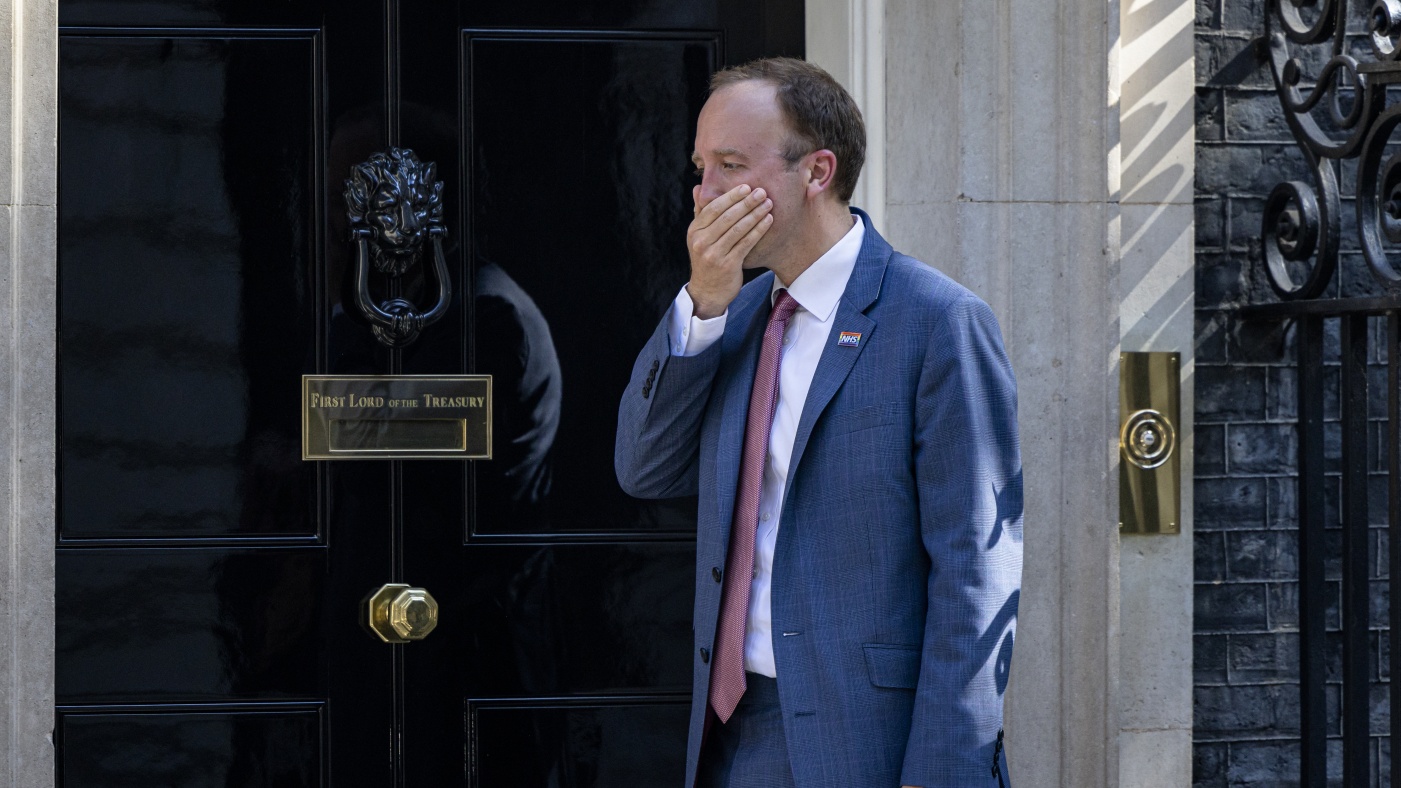Will the Lockdown Files change Westminster’s WhatsApp ways?
A leaked cache of Matt Hancock’s messages raises questions over how app is used in government

A free daily email with the biggest news stories of the day – and the best features from TheWeek.com
You are now subscribed
Your newsletter sign-up was successful
Questions are being raised over Westminster’s reliance on WhatsApp after a leak of more than 100,000 messages sent to and from the then health secretary Matt Hancock during the coronavirus crisis.
The Telegraph has published a huge cache of messages sent between Hancock and other ministers and officials at the height of the Covid-19 pandemic. The exchanges were handed to the newspaper by journalist Isabel Oakeshott, the co-author of Hancock’s recently published diaries.
Among other revelations, the messages revealed how Hancock allegedly did not follow advice from the chief medical officer, Professor Sir Chris Whitty, to test all residents going into English care homes during the worst of the pandemic.
The Week
Escape your echo chamber. Get the facts behind the news, plus analysis from multiple perspectives.

Sign up for The Week's Free Newsletters
From our morning news briefing to a weekly Good News Newsletter, get the best of The Week delivered directly to your inbox.
From our morning news briefing to a weekly Good News Newsletter, get the best of The Week delivered directly to your inbox.
They also contained some testy exchanges between Hancock and his former Conservative colleague turned newspaper editor George Osborne. “No one thinks testing is going well, Matt,” Osborne reportedly texted Hancock, who was once his chief of staff. And the education secretary at the time, Gavin Williamson, was reported to have moaned that some teaching unions “really do just hate work”.
“Gossipy though some of the material is, the saga also tells us much about the way that the coronavirus crisis was handled,” said Nimo Omer in The Guardian. The cache of messages “raises questions about the balance between speed and accountability when the country is at least partly run from a smartphone”.
What did the papers say?
“I’d resign and move to another country,” was the response of one UK civil servant when asked how they would react if all their private communications during the pandemic were leaked to the press, reported Esther Webber for Politico.
Yet this “nightmare scenario” is exactly what has happened to Hancock. And as he “battles to save his reputation” other figures across Westminster are “starting to worry about getting dragged into the saga”. Whitehall officials and civil servants who had contact with Hancock are “braced for more such embarrassing revelations in the days ahead”, wrote Webber, “and nobody knows which of Hancock’s contacts will be targeted next”.
A free daily email with the biggest news stories of the day – and the best features from TheWeek.com
Some Whitehall officials have defended the use of WhatsApp in a fast-paced environment where decisions needed to be made quickly. They pointed out that “WhatsApp was not used in isolation, but alongside emails and other conversations”. But the “intimate conversations published by the Telegraph expose some uncomfortable truths about the medium” with regard to government scrutiny.
The whole affair raises questions about how information in WhatsApp messages about government business is recorded, said the Institute for Government (IfG) think tank.
While WhatsApp messages on government business do come under the scope of any Freedom of Information (FOI) requests submitted to a department, “many departments do not have the procedures in place to search WhatsApp conversations for relevant information”. Nor do they have “good procedures to ensure that WhatsApp messages are preserved for posterity, as all relevant government records should be”, said the IfG. It added that the public “shouldn’t have to rely on leaks to find out what happens in government”.
“If Hancock somehow views this whole episode as an invasion of his privacy, it’s clear he invaded it himself,” wrote Paul Waugh for the i news site. Waugh derided the former health secretary for believing he could “hand over the entire contents of his phone” to an “openly anti-lockdown journalist, in order to polish his own account of the Covid years”.
“Yet it’s clear that many of these ‘private’ messages should indeed be subject to scrutiny by the public,” wrote Waugh. “The good news is that the Covid Inquiry has pretty wide-reaching powers to demand documentation of all kinds and any formal policy decision has to be recorded by Whitehall.”
But the “real problem”, added Waugh, “is that ministers and officials are allowed to delete their messages – long before any public inquiry or campaign group demands to see them”. That’s due to a ruling by the Court of Appeal last November, which said that the use of auto-delete software was not unlawful.
“If disappearing messages become endemic in Whitehall, the public’s ability to scrutinise our governments will disappear too,” he said.
What next?
Due to the leak of Hancock’s WhatsApp messages to the Telegraph and the upcoming Covid inquiry, there is likely to be greater “scrutiny” of the use of messaging platforms in Westminster, said The Guardian.
But “it seems unlikely that there will be substantive change”, said the paper, as the government will want to be seen to be tackling more substantive issues, such as the cost of living crisis, rather than quibbling over how the government communicates internally.
After this debacle, ministers may be “more likely to use disappearing messages or to erase their histories for fear of being caught out”, said the paper, which means transparency over government decision-making could be clouded in the future.
Sorcha Bradley is a writer at The Week and a regular on “The Week Unwrapped” podcast. She worked at The Week magazine for a year and a half before taking up her current role with the digital team, where she mostly covers UK current affairs and politics. Before joining The Week, Sorcha worked at slow-news start-up Tortoise Media. She has also written for Sky News, The Sunday Times, the London Evening Standard and Grazia magazine, among other publications. She has a master’s in newspaper journalism from City, University of London, where she specialised in political journalism.
-
 How the FCC’s ‘equal time’ rule works
How the FCC’s ‘equal time’ rule worksIn the Spotlight The law is at the heart of the Colbert-CBS conflict
-
 What is the endgame in the DHS shutdown?
What is the endgame in the DHS shutdown?Today’s Big Question Democrats want to rein in ICE’s immigration crackdown
-
 ‘Poor time management isn’t just an inconvenience’
‘Poor time management isn’t just an inconvenience’Instant Opinion Opinion, comment and editorials of the day
-
 How are Democrats turning DOJ lemons into partisan lemonade?
How are Democrats turning DOJ lemons into partisan lemonade?TODAY’S BIG QUESTION As the Trump administration continues to try — and fail — at indicting its political enemies, Democratic lawmakers have begun seizing the moment for themselves
-
 How did ‘wine moms’ become the face of anti-ICE protests?
How did ‘wine moms’ become the face of anti-ICE protests?Today’s Big Question Women lead the resistance to Trump’s deportations
-
 How are Democrats trying to reform ICE?
How are Democrats trying to reform ICE?Today’s Big Question Democratic leadership has put forth several demands for the agency
-
 Why is Tulsi Gabbard trying to relitigate the 2020 election now?
Why is Tulsi Gabbard trying to relitigate the 2020 election now?Today's Big Question Trump has never conceded his loss that year
-
 Will Democrats impeach Kristi Noem?
Will Democrats impeach Kristi Noem?Today’s Big Question Centrists, lefty activists also debate abolishing ICE
-
 Do oil companies really want to invest in Venezuela?
Do oil companies really want to invest in Venezuela?Today’s Big Question Trump claims control over crude reserves, but challenges loom
-
 What is China doing in Latin America?
What is China doing in Latin America?Today’s Big Question Beijing offers itself as an alternative to US dominance
-
 Why is Trump killing off clean energy?
Why is Trump killing off clean energy?Today's Big Question The president halts offshore wind farm construction